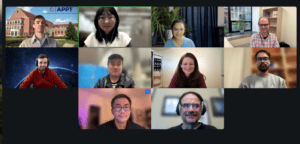Yuanying Pang, a doctoral student in the School of Information, has had a first-author paper accepted for publication by PLOS ONE, a peer-reviewed, open access scientific journal published by the Public Library of Science (PLOS). Titled “Predicting adherence to gamified cognitive training using early phase game performance data: Towards a just-in-time adherence promotion strategy,” this paper is the result of an NIH R01 grant on Adherence Promotion with Person-Centered Technology (APPT, R01AG064529), the National Institutes of Health’s mo st used grant for independent research projects.
st used grant for independent research projects.
“I am truly grateful for the mentorship, resources, and support that have been instrumental in bringing this project to fruition,” said Pang.
Her journey into this research has been driven by a deep interest in health informatics, which has fueled her passion for exploring innovative solutions in the field. This study aims to develop a machine learning-based approach to predict adherence to gamified cognitive training using the data collected in a previously conducted clinical trial. Pang said joining the APPT team was a significant turning point, crediting the collaborative atmosphere to be one of the most inspiring aspects of her experience.
“Working alongside professors from various colleges and peers with diverse expertise has been invaluable. The lively discussions and exchange of ideas within the team greatly enriched my perspective and played a crucial role in shaping the direction of my research by not only helping in constructing the article but also guiding me in determining the final trajectory of my study.”
Pang’s findings carried significant implications for the design and implementation of tailored cognitive training interventions. “By identifying early warning signs of potential lapses in adherence, programs can be dynamically adjusted to enhance user engagement and improve adherence rates. This approach paves the way for more effective and personalized interventions, ultimately maximizing the benefits of gamified cognitive training,” said Pang.

This was Pang’s first experience as the first author of a research paper. Having spent over a year working on the paper, she often found it difficult to gauge whether her writing was clear to others. To overcome this, she repeatedly revised the article, focusing on refining the clarity and coherence of her arguments.
“This experience has been incredibly rewarding, as it taught me the importance of perseverance,critical thinking, and collaboration in academic publishing. I have learned so much from this journey, and it has strengthened my confidence in tackling similar challenges in the future,” said Pang.
Co-authors of this paper include Ankita Singh (PhD graduate in Computer Science), Shayok Chakraborty (Associate Professor of Computer Science), Neil Charness (Retired Professor of Psychology) Walter R. Boot (Professor at Weill Cornell Medicine), and Zhe He (Associate Professor at School of Information). Dr. Zhe He is the Corresponding Author of this paper.
To learn about Pang’s findings, click here and read more!

